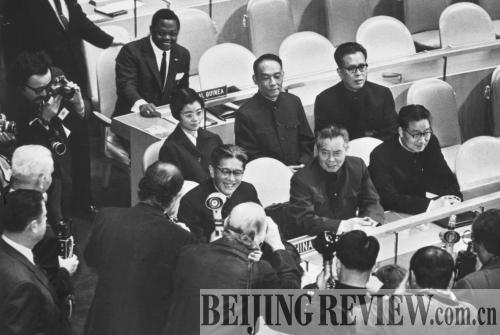|
 |
|
A WELCOME RETURN: Journalists surround the Chinese delegation attending the 26th Session of the UN General Assembly on November 15, 1971. It represented the first time that the People's Republic of China took part in the UN General Assembly following the restoration of its lawful seat in the world body the previous month (XINHUA) | Diplomats cannot, and should not, be puppets of interest groups, but they should always strive for the progress of their nation and, by extension, the whole world.
What difficulties will Chinese diplomacy face in the future?
One of the difficulties for the Chinese diplomatic corps is how to eliminate the "China threat" theory against the overall backdrop of China's rise.
There are different solutions to different versions of the "China threat" theory. China's "military threat" will naturally disappear with the establishment of the image of a peaceful China.
However, China's "economic threat" will likely prove harder to eliminate with the development of the Chinese economy. China's status as a burgeoning new economic power will likely last into the future. This will impose huge pressure on Chinese diplomacy.
Another difficulty will be how to address specific issues. In recent years, ethnic separatists—including forces advocating the "independence" of Tibet and Xinjiang—have continuously challenged China's national sovereignty and security. Dealing with relations with nations in the Islamic world and with trans-border ethnic groups will also be a paramount issue facing Chinese diplomats.
The solution to these problems, meanwhile, is related to China's domestic policies and institutions. Big countries are different from small and medium-sized ones. For a country as big as China, the driving force for development mainly comes from the improvement of its internal systems. Its ebb and flow lie in its own systems, policies, strategies and handlings of certain significant issues, but not in external conditions.
China's development is the result of its own continuous adjustments. The degree to which China can play a greater role in the world lies in whether the country can maintain its momentum of reform rather than being unduly influenced by external factors.
Could you briefly introduce what else this series contains besides the two published books?
The Chinese Diplomatic Studies series consists of 13 books altogether. Until now, High Land Over China Foreign Affairs written by myself and Sixty Years of China's Foreign Affairs (1949-2009) edited by Tan Xiuying and myself have already been published.
The others will be published by the end of this year or the beginning of next year by the China Social Sciences Press.
This is the first series of works on the cutting-edge topics of Chinese diplomacy since reform and opening up began in 1978. The authors are mostly young and middle-aged scholars specializing in international relations, international politics and diplomatic studies and working in famous universities and research institutions. These books offer analyses of Chinese diplomacy, while serving as a point of reference for decision-making.
Besides general topics on Chinese diplomacy, these volumes offer new research based on Chinese perspectives in recent years.
For instance, they include China's national identity during the process of national renaissance, Internet nationalism, Chinese feminist studies, non-traditional security, the Chinese media's role in diplomacy, the security concepts of contemporary Chinese college students and the 60 years of Chinese military diplomacy, among other subjects. | 